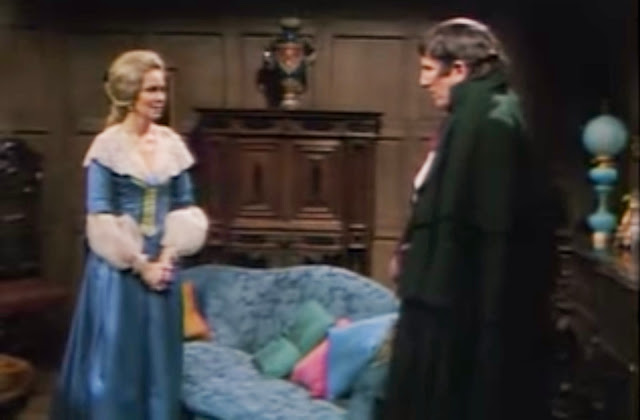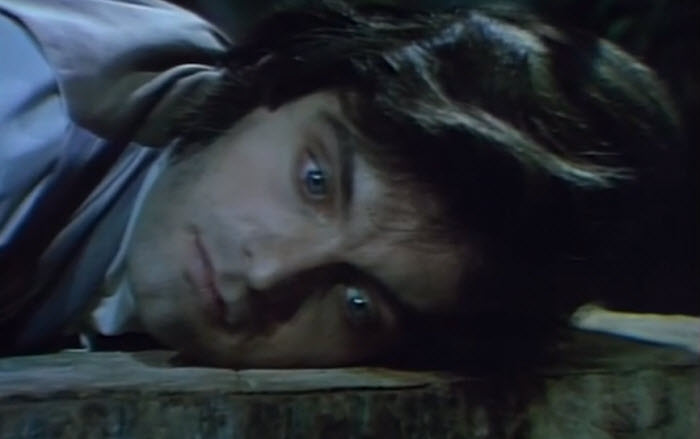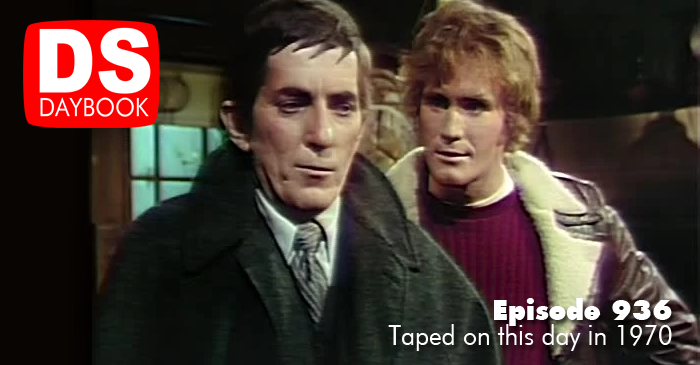By PATRICK McCRAY
Taped on this day in 1971: Episode 1197
Guess what happens when the characters do all of the right things and suddenly have the prospect of happiness welcoming them with open arms? Miranda Duval: Lara Parker. (Repeat; Our Entire Lives)
Angelique interrupts the execution of Quentin and Desmond with the severed head of Judah Zachery. When its flesh dissolves with the death of Ivan Miller, even jaywalking tickets are forgiven by the judge. Unable to live with this outbreak of rampant justice and happiness, Lamar Trask shoots Angelique just before she can hear that Barnabas loves her. The End.
“Attention must be paid.”
So said the Widow Loman at the grave for someone prized only for his insignificance.
I have come back to these episodes more times than any other. This year, it feels irresponsible to devote more words to them. And yet, it feels irresponsible not to. A show the size of Dark Shadows is more than a television program; it is a companion. If you spent three hours on a hobby with a friend, twice a month, for six years, you’d develop an understandable bond. That stretch of time is how long it would take you to watch this story. It’s a feast of a tale. Many times, in ways good and bad, it feels endless. The story accrues around the edges, in no more rush than the real lives it punctuates. 1967 is always fresh. 1968 is always a rich and intriguing core sample. 1969 is always better than we deserve. 1970 always pales by comparison, trawling for us to apologize for it. 1971 is always too short… a reminder of what it’s like to still love something when everyone else stops.
I remain unshaken in my assertion that Dark Shadows is the most realistic show on TV. It just kind of putters around, threatening to do something significant and then just kind of… usually not. Most of the news is bad. We get used to it.
And then someone is shot and killed.
I’m not being glib when I say that. No, not every tragedy is a sudden and fatal gunshot wound. But I guarantee you that there is someone out there reading this who has lost someone precious, precisely that way. And that’s how this episode ends.
The most famous quote about television is that “the medium is the message.“ In other words, the means by which we consume art is as significant a statement as the art being exhibited. Dark Shadows is many things that it had no intention of being. (Newsflash: this goes for all art.)
Like all art, however, it is a teacher above all else. Primarily, it teaches us to look at ourselves from a completely different point of view. But if you watch the entire show, the very storytelling, itself, is the most significant message. Maybe more than one.
The most immediate one is, in the words of Folcroft Sanitarium director, Dr. Harold W. Smith, “Thou shall not get away with it.”
The assassination of Angelique is a convenience. The actors want to move to a fresh storyline. The writers are probably hoping that new characters will give them new ideas. And the ritual of storytelling inevitably veers toward drab moralizing. In this modern world dominated by an antediluvian ethos, we certainly hear a lot about forgiveness. And at the same time, we also live in a culture that absolutely revels in just desserts.
We love forgiveness because it makes Oprah happy. It’s what we are supposed to do because somehow it will liberate us. It will certainly liberate the people in our lives who are sick of hearing us complain about something. It’s vaguely godlike, so I guess it’s got that going for it.
But is it just me, or does a lot of the forgiveness we hear about seem to have its fingers crossed behind its back?
Why? We just can’t stand the idea of someone getting away with it. Any of it. And because we can’t make up our minds which of these things — beatific forgiveness or righteous punishment — we will fetishize more, we look to fiction to give us both at the same time. And who has to pay the tab?
Angelique.
So, of course Trask has to plug her. The fatheaded, arbitrary rules of the ritual that is fiction decree it to be so. There are plenty of Dark Shadows fans who love to sweep in at this point with a list of all of the horrible things Angelique has done, and I guess this… helps? But I hope you have a list of all of the rotten things Barnabas has done, because he’s just as deserving of the naughty step. And he pays, also. He pays an ongoing price too terrible for the show to make us watch.
And culture smiles on us for having it both ways. We applaud their 11th hour moral reversals safe in the “irony“ that they are being punished anyway.
Extra! Extra! Read all about it. The one thing these characters learn is that the past belongs in the past. All we have is the present. All we have are the decisions we are making right now. I spend 90% of my day apologizing for what I say the other 10%, and when someone is really going to town on me, I gently remind them that it won’t build a time staircase to allow me to make different decisions.
The saddest part about episode 1197 is that the present is the one thing these characters are denied. That’s nothing to feel good about. That’s nothing to applaud. And perhaps, it’s nothing to applaud in our art. Perhaps that’s the message we should actually be taking away.
When significance erupts in the mundanity of our everyday lives, it is shockingly sudden. There’s no taking it back. And then, the show ends. There’s no montage. There’s not even a funeral at which Barnabas can insist that attention must be paid.
If you’re going to forgive, mean it. Move on. Do it in the name of the future that Angelique and Barnabas never got.
This episode hit the airwaves on January 26, 1971.



